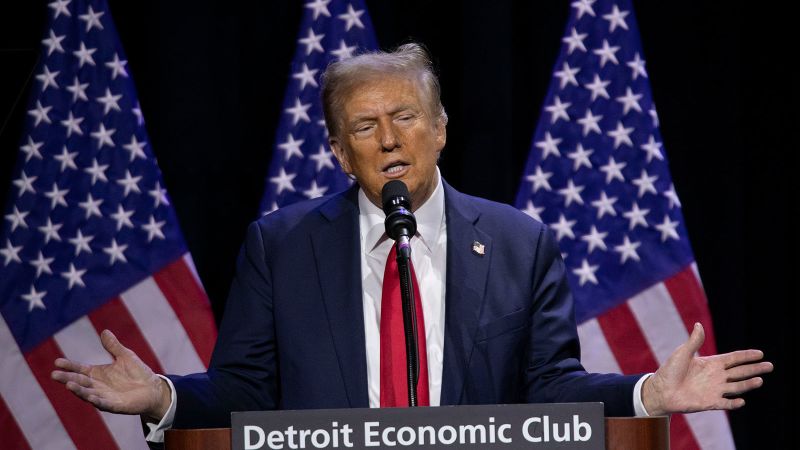Former President Donald Trump announced a new set of targeted tax break proposals during a speech at the Detroit Economic Club, promising to make interest paid on car loans fully tax deductible. He argued that this would stimulate domestic auto production and make car ownership more affordable for working American families, particularly in states like Michigan that are home to many automakers. Trump positioned his proposals as a plan to save the American auto industry and create more manufacturing jobs across the country.
In addition to the car interest deduction, Trump also pledged to address double taxation on Americans living abroad, aiming to eliminate this burden and provide relief for overseas citizens. By doing so, he hopes to garner support from this voting bloc, assuring them that he will take care of their taxation concerns. Trump’s proposals are part of a series of costly tax cuts he has unveiled in recent months, targeting specific voting demographics that he is seeking to secure for the upcoming election. These proposals include eliminating taxes on tips, Social Security benefits, and overtime pay, as well as lifting the cap on state and local tax deductions.
However, the price tag associated with these tax measures is significant, leading to an estimated increase in the national debt by $7.5 trillion over a decade, according to the Committee for a Responsible Federal Budget. This figure does not take into account the increased tariffs that Trump is also seeking to implement, further complicating the economic impact of these tax cuts. In comparison, Vice President Kamala Harris’ policy package is projected to raise the debt by $3.5 trillion, reflecting the differing approaches to taxation and economic policy between the two presidential candidates.
Some experts have questioned the rationale behind Trump’s targeted tax breaks, including the specific focus on car loans as a deductible expense. Howard Gleckman, a senior fellow at the Urban-Brookings Tax Policy Center, described the car interest deduction as campaign pandering, suggesting that it may not provide significant economic benefits. Despite criticism, Trump remains committed to his tax proposals and continues to appeal to various constituencies by offering relief on specific tax burdens. This approach is part of his broader strategy to secure support from key voting blocs and highlight his administration’s achievements in tax policy during his first term.
As Election Day draws closer, Trump’s tax proposals seek to showcase his commitment to providing economic relief and stimulating domestic production across different industries, particularly in key swing states like Michigan. By offering targeted tax breaks and addressing issues such as double taxation on Americans living abroad, Trump aims to appeal to a diverse range of voters and secure their support in the upcoming election. However, the potential impact of these tax measures on the national debt raises concerns among experts, highlighting the need for a comprehensive evaluation of the economic consequences of these proposals.













